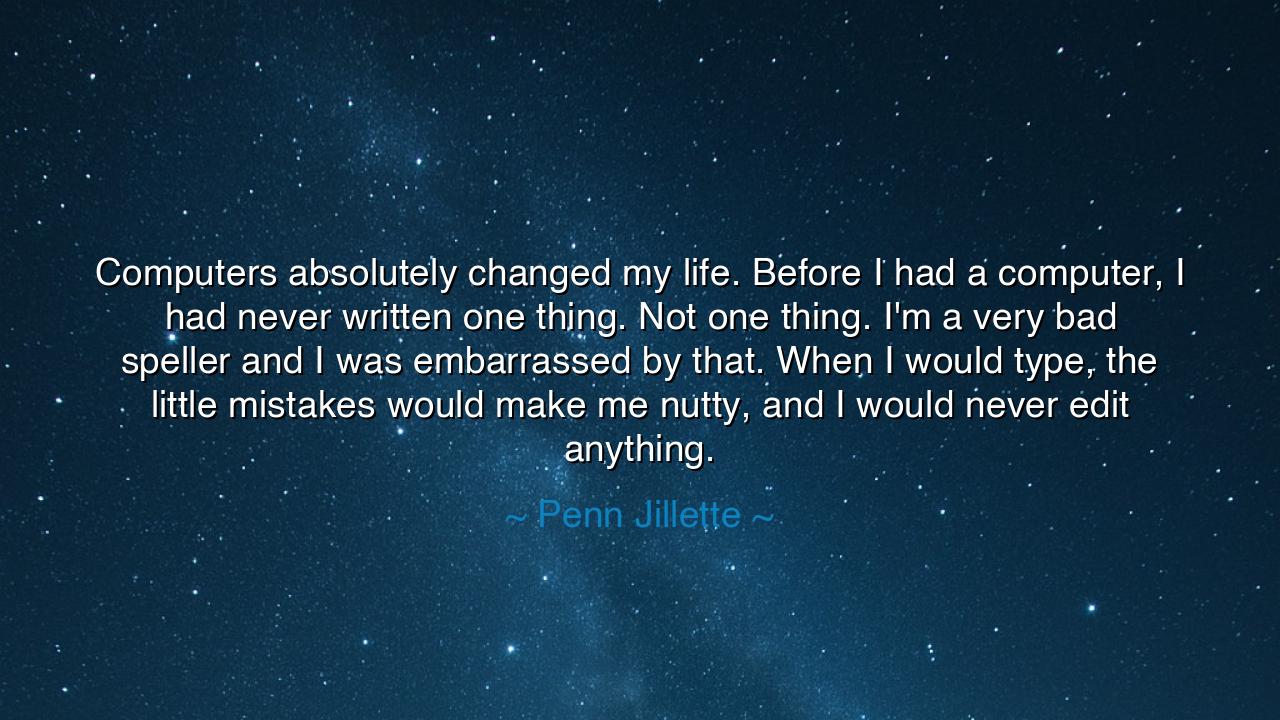
Computers absolutely changed my life. Before I had a computer, I
Computers absolutely changed my life. Before I had a computer, I had never written one thing. Not one thing. I'm a very bad speller and I was embarrassed by that. When I would type, the little mistakes would make me nutty, and I would never edit anything.






"Computers absolutely changed my life. Before I had a computer, I had never written one thing. Not one thing. I'm a very bad speller and I was embarrassed by that. When I would type, the little mistakes would make me nutty, and I would never edit anything." – Penn Jillette
In the vast span of human history, few inventions have had as profound an impact on the individual experience as the computer. Penn Jillette, in his reflection, reveals the quiet power of this seemingly simple device. For Jillette, the computer was not just a tool for work or leisure; it was a transformational force that reshaped his identity, enabling him to overcome personal insecurities and unlock his creative potential. His struggle with spelling and perfectionism echoes a truth that many of us understand: that the fear of making mistakes—whether in our writing or in life—can paralyze us, preventing us from moving forward. Yet, with the advent of the computer, this fear was not only alleviated but transformed into an opportunity for growth and expression.
In the ancient world, great minds were often held back by imperfections in their tools, whether those tools were the instruments of writing or the mediums of thought. Socrates, for example, famously distrusted the written word, believing that true wisdom was passed through oral tradition and dialogue. Yet, even in his time, the tools of communication—like the written word—were powerful enough to change the flow of knowledge. The computer, like the writing of the ancients, acts as a tool of transformation—allowing us to transcend our limitations and express ourselves freely, despite the imperfections that once held us back. Jillette’s words speak to this transformative potential: a tool that helps us navigate our weaknesses and use them as stepping stones to creativity.
Just as Jillette struggled with his spelling, so too have countless individuals in the past faced obstacles that made their expressions feel incomplete or flawed. The great poets of ancient times, such as Homer, worked with oral traditions, relying on memory and performance rather than the written word to convey their epics. The process of oral storytelling was often riddled with imperfections—missed words, forgotten lines, and evolving narratives—but it was also a dynamic, living art. The computer, in Jillette’s experience, brings a similar kind of freedom. By allowing him to edit, rework, and perfect his ideas, the computer elevated him from a place of fear to one of expression—just as the written word once did for the ancient storytellers who had the courage to speak their truth.
Consider the story of Leonardo da Vinci, whose sketches and designs were marked by a sense of perfectionism that sometimes prevented him from finishing his work. Leonardo's notebooks are filled with unfinished inventions, ideas that never fully took shape, because he was often hindered by his desire for everything to be flawless. If he had access to the computer, perhaps his ideas would have been able to take shape in a different way—offering him the freedom to work through imperfections and iterate on his ideas more fluidly. Like Jillette, Leonardo was a perfectionist, and often this pursuit of perfection slowed his creative process. The computer, in its power to offer instant corrections, allows us to overcome such obstacles, embracing imperfection as part of the creative process rather than an impediment to it.
The lesson in Jillette’s words is one of freedom—freedom to create, to express, and to fail without fear of judgment. Before the age of computers, many were paralyzed by the fear of making mistakes—whether in spelling, grammar, or form. But with the advent of modern technology, the ability to edit, to revise, and to improve has made it possible for all of us to express our deepest thoughts without fear of being trapped by our own imperfections. We are reminded that imperfection does not make us any less capable, but is rather a part of the creative process. The computer, as Jillette explains, is a tool that allows us to push past the limitations that once confined us.
As we move forward in this world of technological advancement, let us take Jillette’s lesson to heart: that progress is not just about overcoming external barriers, but also about embracing the tools that allow us to express ourselves fully. Computers may have seemed like mere machines of convenience, but in reality, they offer us the opportunity to grow, to create, and to conquer our own limitations. Just as ancient thinkers once embraced the written word to overcome the limitations of oral storytelling, so too must we embrace the tools of today to liberate our voices. Let us no longer be held back by fear of imperfection, but embrace the freedom that comes with being able to rework, edit, and ultimately express the very essence of our thoughts.
The key is courage—the courage to face the imperfections of our work, and to use technology not as a crutch, but as a means of empowerment. By understanding that the creative process is one of evolution, not perfection, we can begin to move beyond our own self-imposed limits. And just as Jillette has used the computer to turn his struggles into strengths, so too can we use the tools at our disposal to unlock our full potential, embracing imperfection as the stepping stone to greatness.






AAdministratorAdministrator
Welcome, honored guests. Please leave a comment, we will respond soon